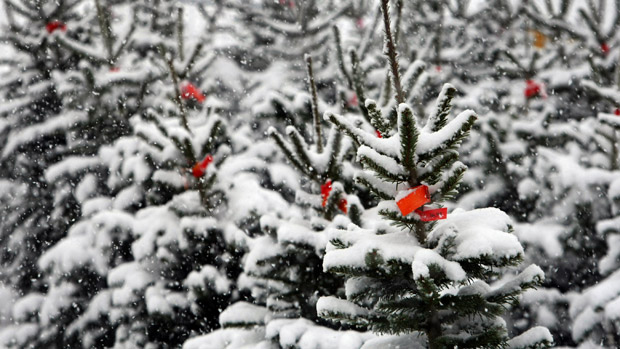Will the UK see a white Christmas in 2024?
Snow has fallen on Christmas Day in the UK 39 times in the last 53 years, according to Met Office data

A free daily email with the biggest news stories of the day – and the best features from TheWeek.com
You are now subscribed
Your newsletter sign-up was successful
Snow has fallen on Christmas Day 54 times in the past 65 years, according to the Royal Meteorological Society.
Those dreaming of a white Christmas this year have been given a smidgen of hope, with current forecasts holding open the prospect of "some snow" in the second half of December.
As we "move towards mid-December", said the Met Office in its most recent long-range forecast, weather conditions may become "less settled", with "wetter and windier interludes" and a "risk of some snow", especially for "hills in the north". These conditions "may prevail into late December", added the forecasters, but "drier, more settled spells may also affect the UK at times".
The Week
Escape your echo chamber. Get the facts behind the news, plus analysis from multiple perspectives.

Sign up for The Week's Free Newsletters
From our morning news briefing to a weekly Good News Newsletter, get the best of The Week delivered directly to your inbox.
From our morning news briefing to a weekly Good News Newsletter, get the best of The Week delivered directly to your inbox.
"Outside of advertisements and Hollywood films, idyllic snow-filled Christmas scenes are becoming increasingly rare in the UK", said The Guardian in 2022. The paper's analysis found that the chances of a white Christmas have "become slimmer as the climate has grown warmer". On average, snow was "much less likely to fall on Christmas Day in the 2010s than it was in the 1960s", according to analysis of Met Office data.
How likely is a white Christmas?
Most people imagine a snowy wonderland when they talk about a white Christmas, but the official Met Office definition is "for one snowflake to be observed falling in the 24 hours of 25 December somewhere in the UK".
Over the past 65 years, snow has fallen somewhere in the UK on Christmas Day 54 times, said Met Matters, the Royal Meteorological Society site. Last year was officially a white Christmas in the UK, said the Met Office, although only "11% of stations recorded snow falling", and "none reported any snow lying on the ground".
Those hoping for a thicker blanket of snow have been left wanting a long time. The last time the UK celebrated widespread snow was in 2010, when 83% of weather stations recorded snow on the ground, the highest number ever recorded. The year before, 57% of stations reported snow on the ground.
A free daily email with the biggest news stories of the day – and the best features from TheWeek.com
Forecasters say we are generally less likely to see snow in December than in the following three months. On average, snow or sleet falls for fewer than four days in December, compared with more than five days in January and February, and just over four days in March.
"White Christmasses were more frequent in the 18th and 19th centuries, even more so before the change of calendar in 1752 which effectively pushed Christmas Day back by 12 days," said the Met Office.
It is now "extremely unusual" to experience a white Christmas like that of 2010.
Air temperatures do not need to drop below zero for snow to fall. In fact, the heaviest snowfalls tend to occur between 0 degrees C and 2 degrees C, as the slightly warmer air causes snowflakes to melt and stick together forming bigger, heavier flakes.
Is there any chance of a white Christmas in 2024?
Those waiting for a Christmas miracle shouldn't get their hopes up too soon. The Met Office's long-range forecasts are subject to change, and the most accurate forecasts will be issued in the five days before Christmas.
But "further colder spells remain possible" on the big day, said Met Matters, so "there is definitely a chance of a festive snowflake".
According to betting comparison site Oddschecker, Aberdeen is the UK city most likely to see snow on Christmas Day, with odds currently set 5/4. London is the least likely, with odds of 8/1.
Chas Newkey-Burden has been part of The Week Digital team for more than a decade and a journalist for 25 years, starting out on the irreverent football weekly 90 Minutes, before moving to lifestyle magazines Loaded and Attitude. He was a columnist for The Big Issue and landed a world exclusive with David Beckham that became the weekly magazine’s bestselling issue. He now writes regularly for The Guardian, The Telegraph, The Independent, Metro, FourFourTwo and the i new site. He is also the author of a number of non-fiction books.